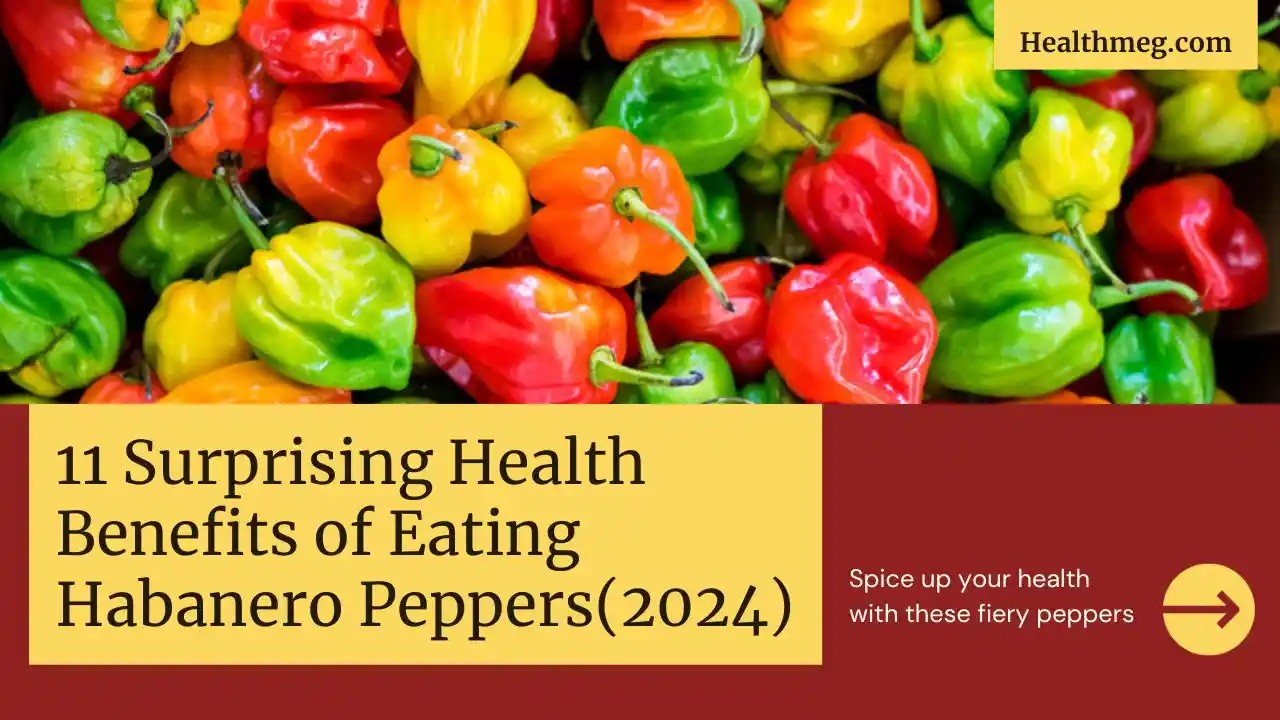Introduction
Known for their extreme spiciness and fiery punch, habanero peppers often intimidate with their blistering potency. However, there’s more to these popular spicy peppers than meets the heat. Underneath that walloping spiciness, habaneros conceal some powerfully beneficial nutrients and promote several surprising health effects.
Despite their kick, habaneros merit an occasional appearance in your daily diet. Recent medical findings highlight the impact of capsaicinoids—the chemicals producing their spice—on overall wellness.
Do read the People Also Ask (FAQs) about this topic.
Key Takeaways:
- Habanero peppers contain a high concentration of beneficial bioactive compounds like capsaicin as well as antioxidants.
- Research shows capsaicin activates receptors in the body that drive positive impacts ranging from increased metabolism and fat burning to decreased inflammation.
- Consuming habaneros regularly aids in weight loss, protects cardiovascular health, fights cancer, supports gut and respiratory health, and more.
- Despite their intense spiciness, habaneros confer surprising digestive benefits – improving stomach motility, killing bacteria, preventing ulcers, and stimulating gastric juices.
- Population and clinical studies link frequent habanero consumption to reduced risk of major diseases like diabetes, dementia, liver disease and some cancers.
- Adding moderate amounts of habanero pepper into your diet helps prevent disease, boosts overall wellness, and may support longevity.
Health Benefits of Eating Habanero Peppers:
- Aids in Weight Loss
- Protects Cardiovascular Health
- Fights Inflammation
- Protects Against Cancer
- Supports Gut Health
- Protects Against Ulcers
- Supports Respiratory Health
- Protects Liver Health
- Fights Diabetes
- Protects Brain Health
- May Boost Testosterone
1: Aids in Weight Loss
Research increasingly demonstrates capsaicin’s benefits for dropping excess pounds. The activation of receptors prompts enhanced metabolism converts white stubborn fat to healthier brown fat, and curbs unhealthy fat accumulation. This translates to easier weight management and promoting healthier body composition.
Additionally, the heat of habaneros slightly boosts thermogenesis—increasing body temperature and energy expenditure. A review compiled many human trials, concluding those eating spicy capsaicin burn an extra 50 calories per day and experience suppressed appetite…an easy step toward a trimmer waistline!
2: Protects Cardiovascular Health
Given the widespread prevalence of cardiovascular disease, the far-reaching positive implications of adding habaneros are significant. Studies demonstrate capsaicin holds antisclerotic properties, preventing atherosclerotic plaques that stiffen arteries.
By improving circulation and reducing blood pressure/cholesterol, habaneros deliver a profound heart-healthy punch. Meta-analyses consistently connect chilli intake with a lower incidence of death from cardiac-related events—by over 20% reduction in certain cohorts! For supportive cardiac effects, spice up meals moderately with health-promoting habanero peppers.
3: Fights Inflammation
Chronic inflammation forms the foundation of most pervasive modern diseases…an area where habaneros contain dramatically suppressive effects. Research reveals that capsaicin acts as a potent anti-inflammatory, reducing cellular inflammatory messengers (cytokines).
Additionally, the pepper’s high antioxidant concentration quenches free radicals that drive inflammation. When left unchecked, oxidative stress and inflammation lead to DNA mutation, arterial damage, joint degeneration, and neurotransmitter disruption. By curbing these processes, habaneros benefit autoimmune issues, cardiovascular disease, cancer, diabetes, and neurocognitive decline. Talk about disease protection!
4: Protects Against Cancer
In connection with dampening inflammation pathways and DNA damage involved in cancer progression, scientists increasingly recognize dietary capsaicin as an effective chemopreventive agent. Cell experiments demonstrate that capsaicin induces apoptosis (automatic cell death) in prostate, lung, liver and breast cancer tumour cells.
Rodent models further show marked inhibition of tumour formation, angiogenesis, and metastases…the spread of malignant cells throughout the body. While human data remains limited, all evidence firmly suggests that bioactive compounds in hot peppers confer protection against developing numerous cancer varieties.
5: Supports Gut Health
Via interaction with TRPV1 gut receptors, capsaicin potentially benefits diverse gastrointestinal conditions…from nausea to inflammatory bowel diseases. The pepper compound improves stomach motility, stimulates gastric juices, and even treats H. pylori infection.
Furthermore, scientists hypothesize that capsaicin plays a beneficial role in supporting healthy gut microbiota. Research indicates spicy diets enrich microbial populations and support advantageous intestinal permeability to keep bad bacteria in check. Considering gut health lays the foundation for whole-body wellness, incorporate habaneros to keep your digestive system happy!
6: Protects Against Ulcers
Despite longstanding misconceptions about spicy foods exacerbating ulcers, research demonstrates capsaicin powerfully prevents ulcers by desensitizing pain nerves, enhancing mucosal blood flow and inhibiting acid secretion. Additionally, hot peppers displayed broad-spectrum antibacterial qualities against Helicobacter pylori, the bacteria responsible for the majority of painful stomach ulcers.
Next time you’re looking to protect your stomach lining, reach for some habanero heat rather than avoid it. Clinical findings support hot pepper’s counterintuitive role in treating and preventing ulcer formation!
7: Supports Respiratory Health
Given capsaicin’s potent anti-inflammatory and antioxidant capabilities, incorporating chilli peppers benefits a spectrum of respiratory conditions…from allergies to pulmonary diseases. Trials indicate that capsaicin acts as a natural decongestant.
Furthermore, regular spicy pepper consumption displays positive impacts for asthmatics—reducing attack frequency and improving ventilator capacity. While more research remains necessary, current science suggests that adding habaneros assists respiratory health and alleviates certain breathing issues.
8: Protects Liver Health
Hot pepper’s bioactive chemicals confer advantageous hepatic effects…from protecting organ tissues to improving fat metabolism. Multiple studies reveal that capsaicin consumption protects the liver against toxin exposure, inhibits fat deposition in hepatic cells, and limits markers of liver injury.
Furthermore, hot peppers displayed antibacterial qualities against the Hepatitis C virus in human trials. Considering rising liver disease prevalence from metabolizing toxins, drugs, alcohol and high-fat diets, incorporating habaneros benefits this crucial organ.
9: Fights Diabetes
Type 2 diabetes continues rising at astounding rates, making diet an incredibly useful tool for prevention and treatment. Human trials linkage increased chilli intake with significantly lower diabetes risk. Beyond the metabolism boost, research confirms that capsaicin enhances insulin sensitivity and reduces blood sugar spikes after carb-heavy meals.
Additionally, capsaicinoids preserve precious insulin-producing beta cells within the pancreas that get destroyed in diabetics. Anyone looking to stabilize blood glucose and resist diabetes should tap into habanero’s heat.
10: Protects Brain Health
Of all the health benefits, perhaps the most unexpected is capsaicin’s neuroprotective capacity and cognition support. Population studies demonstrate that regular chilli consumption lowers dementia incidence by 30 to 50%! Researchers believe capsaicinoids reduce brain inflammation, plaque formation and preservation of mitochondria…the powerhouses dictating cellular life/death pathways.
Furthermore, rodent studies reveal that adding hot peppers to diets impedes Alzheimer’s progression, with a marked reduction of neuron-killing toxins. While human clinical evidence remains limited, all signs point to the brain-boosting benefits of spicing up meals with healthy habanero peppers!
11: May Boost Testosterone
Emerging research suggests that consuming hot peppers like habaneros can increase testosterone levels in men. Studies demonstrate that capsaicin helps reduce the breakdown of testosterone into estrogen—raising testosterone bioavailability.
Additionally, population data indicates positive correlations between testosterone concentration and frequent spicy pepper consumption. While human clinical trials remain limited, early findings imply that incorporating habaneros into your eating plan can help support healthy testosterone status.
Spicing It Up
Despite their scorching first impression, habaneros hold a healthful punch that shouldn’t be ignored. Adding these hot helpers provides an easy, tasteful way to boost nutrition while preventing chronic disease. Luckily, their heat rapidly dissipates with cooking, letting you easily incorporate habaneros into stews, salsas, stir-fries, etc.
Start slowly with these blistering peppers until your body adjusts and beware of touching eyes, pets or kids after handling raw peppers. When it comes to produce-aisle health enhancers though, habaneros shouldn’t get dismissed because of their bite—given the surprising magnitude of benefits, the spice is undoubtedly worth it!
Habanero Pepper Nutrition
The capsaicin in habanero peppers activates cell receptors, which drive a cascade of healthful effects. Incredibly, eating a single pepper meets about half the vitamin C daily requirements. Besides supplying an abundance of vitamins, habaneros provide a rich density of antioxidants and anti-inflammatory nutrients.
Single raw habanero (about 17 grams) contains approximately:
- Vitamin C: 50 milligrams (56% DV)
- Vitamin A: 455 IU (9% DV)
- Folate: 10 micrograms (3% DV)
- Vitamin B6: 0.2 milligrams (9% DV)
- Potassium: 97 milligrams (3% DV)
- Copper: 0.05 milligrams (3% DV)
Habaneros also deliver carotenoid antioxidants like beta carotene, zeaxanthin, and cryptoxanthin. When it comes to heat intensity, the spiciest habanero scores over 300,000 Scoville Heat Units! For comparison, a jalapeño ranges from 2,500 to 8,000 SHUs.
Is habanero good for your stomach?
Yes, habanero peppers are good for your overall stomach health, despite their intense fiery reputation. Some of the specific ways that habaneros can benefit digestive health include:
- Stimulates gastric juices – The capsaicin in habaneros interacts with receptors in your stomach to increase secretions of gastric acids and digestive juices. This aids in the breakdown and absorption of food.
- Improves gut motility – Capsaicin can act as a digestive stimulant, speeding up contractions in your gastrointestinal tract. This helps move food through your system more quickly.
- Kills harmful gut bacteria – Research shows capsaicin has antimicrobial properties that allow it to fight off harmful pathogens like H. pylori, which causes stomach ulcers.
- Prevents stomach ulcers – Contrary to popular belief, eating habaneros and spicy foods does not cause or exacerbate ulcers. Multiple studies demonstrate it protects the stomach lining due to increased mucosal blood flow and other protective effects.
So while their extreme heat may result in temporary oral discomfort, incorporating habaneros into your diet can deliver lasting benefits for overall stomach health and function. Just be sure to gradually increase intake to allow your body to adapt as you add these blistering hot peppers.
Conclusion
Rather than avoiding their searing spicy punch, incorporating habanero peppers into your eating plan can ignite major health upsides. Abundant science now reveals that under that blistering heat, habaneros harbour powerful protective and disease-fighting properties. With an impact spanning from the enhancement of fat burning, gut health and testosterone to slashing inflammation, oxidative damage and risk of numerous chronic illnesses, regularly spicing up meals with habaneros delivers unexpected health dividends.
So next time your eyes start watering from a pepper’s heat, remember those tears may help wash away countless health threats! Given the compelling benefits, embracing habanero’s wholesome kick can spark surprising advantages that extend well beyond their red-hot, tastebud-scorching flavour.
People Also Ask (FAQs)
Q) Are habanero peppers good for you?
A) Yes, habanero peppers are very good for you. Despite their intense spicy heat, they contain beneficial nutrients and capsaicin which provides a multitude of health benefits, including aiding weight loss, reducing inflammation, protecting cardiovascular health, fighting cancer, boosting gut health and digestion, and more.
Q) Why are habaneros so good?
A) Habaneros are so good because their capsaicin content amps up metabolism, fat burning, and curbs appetite. They also pack a big nutritional bonus, with high amounts of antioxidants, vitamins A and C, and B vitamins that reduce inflammation in the brain and body when consumed regularly.
Q) What does habanero do to your stomach?
A) Contrary to expectations, habaneros are good for stomach health. The pepper’s capsaicin stimulates gastric juices, increases motility to move food quicker, and kills off harmful gut bacteria. Studies also found habaneros prevent painful ulcers by increasing protective mucosal blood flow.
Q) What is the nutritional value of a habanero pepper?
A) A single habanero pepper contains a significant dose of immunity-supporting vitamin C, antioxidants, vitamin A for eye and skin health, B vitamins for energy metabolism, potassium for fluid balance, and anti-inflammatory carotenoids like beta carotene. They pack a nutritious, metabolism-boosting punch.
Q) Can you eat habanero every day?
A) Yes, you can safely eat a habanero pepper daily if you first build up tolerance. Start with only a few slivers to acclimate before increasing the pepper’s amount and frequency. Research connected regular spicy pepper consumption with lower risks of cardiovascular disease, diabetes, and obesity.
Q) What are the side effects of habanero peppers?
A) When first trying habaneros, oral burning, tongue/lip swelling, nausea, stomach cramps, or gastrointestinal discomfort can occur temporarily until tolerance increases. Avoid touching eyes or sensitive skin after cutting them due to the irritative oils. Those with gastrointestinal ulcers should proceed cautiously as well.
Q) Can you eat a habanero raw?
A) Yes, you can eat a raw habanero pepper, though their volatile oils unleash intense spice most palates can’t tolerate without building substantial tolerance first. Cooking helps mellow their heat. Whether raw or cooked, be sure to wash your hands thoroughly after prepping these peppers when cooking.
Q) What color habanero is hottest?
A) While most habaneros turn from green to orange when ripe, the red habanero ranks as the hottest at 300,000 to 500,000 Scoville heat units – considerably spicier than your typical orange habanero!
Q) What is a fun fact about habanero?
A) A fun fact is that wild habanero plants evolved their extreme heat as an evolutionary defence mechanism against fungi and hungry herbivores who might damage the seed pods! Today, their natural chemical weapons bring pleasurable burn to chilli-heads and impressive health advantages as well.












